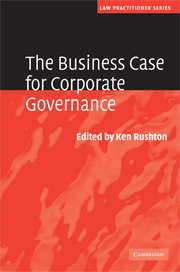Book contents
- Frontmatter
- Contents
- List of contributors
- Acknowledgements
- Introduction
- 1 The role of the board
- 2 The role of the Chairman
- 3 The role of the non-executive director
- 4 The role of the Company Secretary
- 5 The role of the shareholder
- 6 The role of the regulator
- 7 Directors’ duties
- 8 What sanctions are necessary?
- 9 Regulatory trends and their impact on corporate governance
- 10 Corporate governance and performance: the missing links
- 11 Is the UK model working?
- Index
8 - What sanctions are necessary?
Published online by Cambridge University Press: 23 June 2009
- Frontmatter
- Contents
- List of contributors
- Acknowledgements
- Introduction
- 1 The role of the board
- 2 The role of the Chairman
- 3 The role of the non-executive director
- 4 The role of the Company Secretary
- 5 The role of the shareholder
- 6 The role of the regulator
- 7 Directors’ duties
- 8 What sanctions are necessary?
- 9 Regulatory trends and their impact on corporate governance
- 10 Corporate governance and performance: the missing links
- 11 Is the UK model working?
- Index
Summary
Introduction
Corporate governance deals with the ‘processes by which organisations are directed, controlled and held to account and is underpinned by the principles of openness, integrity and accountability’. This chapter will examine that system of accountability in relation to the mainstream requirements of the UK corporate governance environment. In particular, it will look at where and in what form the sanctions which underpin accountability exist and what sanctions are necessary for the regime as a whole to be a success.
Central to the reform debate in the 1990s was the question as to whether the traditional ‘self-regulatory’ approach should be followed or whether governance through legislation and regulation was more appropriate. Corporate Britain, for obvious reasons, favoured the former approach, concern focusing on the fact that governance by legislative or regulatory prescription would constrain innovation, hamper development and wealth creation and potentially result in judicial scrutiny of commercial decisions. In the opposite corner were increasingly vociferous groups of disaffected shareholders, creditors and the wider community who highlighted that the regime, as it existed then, lacked effective sanctions, not only to deter abuse but also to punish it when it did occur.
The way forward was to be a compromise: employing predominantly voluntary codes allowing companies to self-regulate, to grow and to develop without excessive interference but in certain areas using law and regulation to set the boundaries of behaviour, promote transparency and increase accountability.
Currently, views on the effectiveness of the regime remain polarised.
- Type
- Chapter
- Information
- The Business Case for Corporate Governance , pp. 146 - 175Publisher: Cambridge University PressPrint publication year: 2008
- 2
- Cited by



